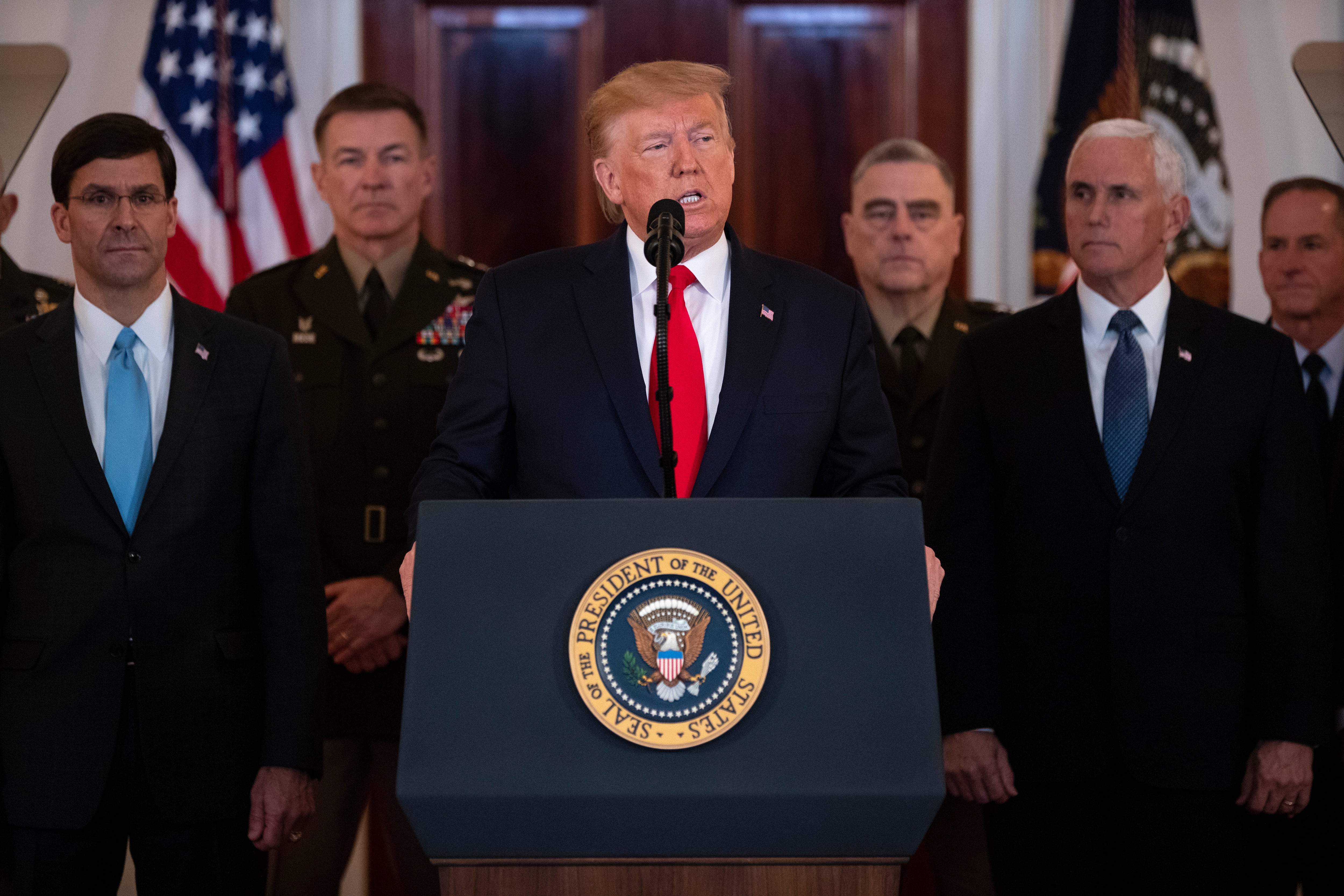WASHINGTON — Even as the threat of war with Iran appeared to ebb this week, House lawmakers on Thursday approved a measure to bar President Donald Trump from further military action against the Middle Eastern power without explicit authorization from Congress.
The resolution, which passed 224-194 largely along party lines, amounts to a rebuke of Trump from the Democratic-led House, but likely will not mean any new restrictions on his military powers. It’s unclear when or if the Republican-led Senate will take up the issue, or if enough members of the president’s own party there would break ranks to approve the resolution.
But ahead of the vote, House Speaker Nancy Pelosi, D-Calif., said the vote was a critical step for Congress to reassert its role in issues of war and national security following the president’s decision (without consultation from lawmakers) to kill Iranian Quds Force commander Qassem Soleimani in an airstrike last week.
“Members of Congress have serious, urgent concerns about the administration’s decision to engage in hostilities against Iran and about its lack of strategy moving forward," she said, adding that the administration “has a responsibility to consult with Congress.”
The resolution directs Trump to end the use of U.S. military forces in hostilities against Iran unless Congress declares war, or unless it’s necessary to defend against an imminent attack. It’s sponsored by Rep. Elissa Slotkin, D-Mich., a former CIA analyst and Defense Department official who has been publicly critical of Trump’s foreign policy decisions.
“If our loved ones are going to fight in any protracted war, the president owes the American people a public conversation,” she said in a statement before the vote.
The White House issued a statement condemning the resolution as potentially undermining the president’s ability to defend U.S. forces and interests in the Mideast against ongoing threats from Iran and its proxies.
Only eight Democrats voted against he resolution, with several saying it didn’t go far enough. Three Republicans backed the resolution. Several blasted it as an unfair and unpatriotic attack on the commander in chief.
“This is a meaningless vote that only sends the wrong message: that the House Democrats would rather stand with their socialist base than stand against Iran,” said House Minority Leader Kevin McCarthy, R-Calif.
Republicans emphasized Soleimani’s role in sharing roadside bomb technology that killed or wounded hundreds of service members during the Iraq War and that U.S. military officials concluded he posed an imminent danger to U.S. troops, allies and interests.
“The president had a duty to act. And I, for one, would be screaming from the rooftops if he had not taken appropriate action,” said Rep. Michael Waltz, R-Fla., and a former Green Beret. “I am thankful for his leadership to take this monster out. Frankly, this should have been done a long, long time ago ... It astounds me that this is up for debate."
The process is complicated because House Republican leaders argue the legislative vehicle for the resolution makes it non-binding and say it would not receive an automatic vote in the Senate. House Democratic leaders argue the opposite, and aides concede a court may have to decide whether the resolution would have the force of law.
RELATED

Meanwhile, in the Senate, several members have already introduced similar proposals to reign in Trump’s ability to attack Iran. If passed, those could receive a fast-track vote in the House.
Sen. Bernie Sanders, I-Vt., and a leading Democratic presidential candidate, on Thursday unveiled a new resolution to potentially defund any U.S. military action against Iran. A similar measure passed the House with bipartisan support in July, but it was stripped from the 2020 defense policy bill before it was enacted.
“The war in Iraq was the worst foreign policy blunder in the modern history of our country,” Sanders said. “We must learn from our mistakes, not repeat them. We need to invest our financial resources in improving lives here in America, not waste trillions more on wars.”
Similarly, Virginia Democratic Sen. Tim Kaine, who has been pushing for congressional action on presidential military authorities for years, this week introduced a war powers resolution to require any action against Iran be explicitly authorized by a declaration of war or new authorization for use of military force. It also would allow U.S. leaders to defend the country from an imminent attack.
The measure received a dramatic boost on Wednesday when a pair of Republican senators — Mike Lee from Utah and Rand Paul from Kentucky — announced they would support the plan. Republicans hold 53 seats in the Senate to the Democrats’ 47, and only 51 votes are needed to approve the resolution.
Lee’s support came after lead officials from the Pentagon, CIA and State Department delivered briefings to lawmakers on Wednesday about the Soleimani killing and ensuing missile attack by Iran on U.S military facilities in the region. Lee and Paul called the briefing “insulting and demeaning” for officials’ unwillingness to honestly discuss the repercussions of a military conflict with Iran.
RELATED

Kaine said he is optimistic about his measure’s chances.
“We're at the brink of war, so I think the stakes are much higher now,” Kaine said. “You know, most of us have families who were at home for Christmas and got a surprise notes that they were being deployed to the Middle East, after multiple deployments. So I would argue the fact that it’s very real might increase the numbers [of Republican supporters].”
Kaine was also optimistic that Trump might abide by his resolution, even it it does not win by a veto-proof majority.
“If he sees a strong vote on this, and it goes to him, it’s an expression of what we’re hearing from constituents, what we’re seeing in polls: that Americans don’t want to be in another war, they don’t want to be rushed into war,” Kaine said.
Still, most Republicans in the Senate have been supportive of the president’s recent actions in the Middle East, especially his decision to kill Soleimani. Whether any of them will break ranks in coming days to support Kaine’s proposal or other plans remains unclear.
“The president of the United States not only has the authority to act in self-defense but an obligation to do so,” said Sen. Marco Rubio, R-Fla.
“This is about a strike that every single member of the president’s national security team — including the chairman of Joint Chiefs — believes was necessary in order to prevent a near-term attack against Americans that could be lethal and catastrophic.”
Joe Gould was the senior Pentagon reporter for Defense News, covering the intersection of national security policy, politics and the defense industry. He had previously served as Congress reporter.
Leo covers Congress, Veterans Affairs and the White House for Military Times. He has covered Washington, D.C. since 2004, focusing on military personnel and veterans policies. His work has earned numerous honors, including a 2009 Polk award, a 2010 National Headliner Award, the IAVA Leadership in Journalism award and the VFW News Media award.








